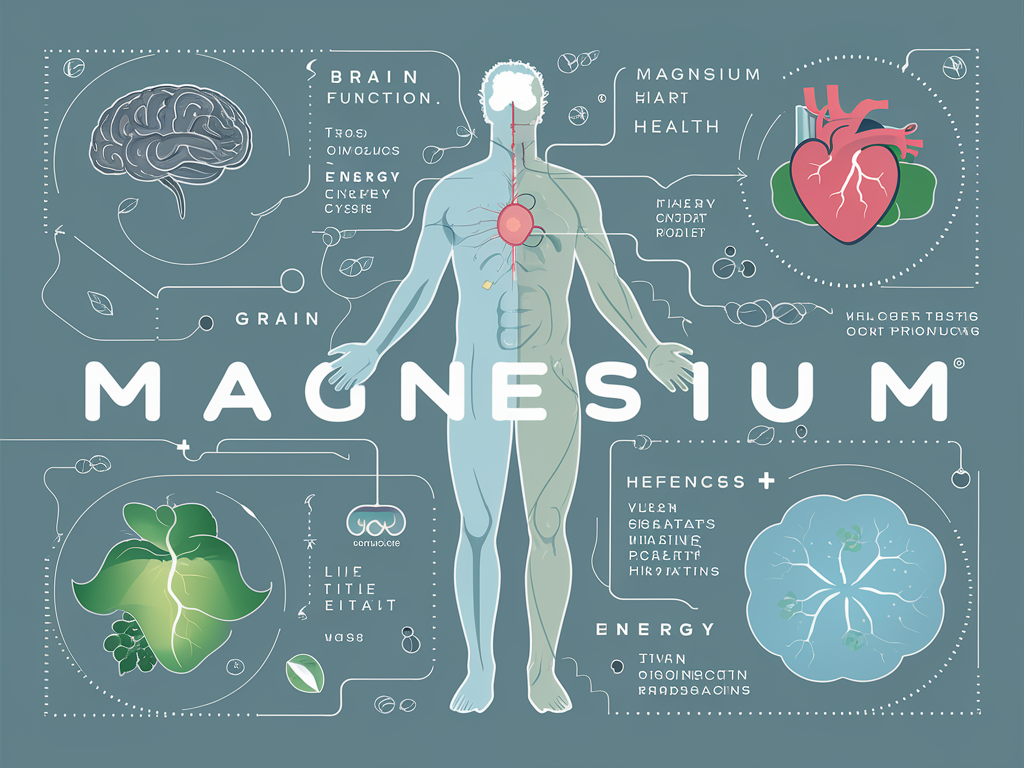Magnesium stands as one of nature’s most vital minerals, yet remains surprisingly overlooked in many health conversations. This powerful element serves as a cofactor in more than 300 enzyme systems that regulate diverse biochemical reactions throughout your body. From protein synthesis and muscle function to nerve regulation and energy production, magnesium’s fingerprints can be found in virtually every aspect of human physiology.
Despite its critical importance, magnesium deficiency has reached concerning levels in modern society. Studies suggest that up to 50% of Americans don’t consume enough magnesium through their diet. This widespread deficiency has been linked to numerous health complications, including cardiovascular disease, type 2 diabetes, and various neurological disorders.
Your body’s reliance on proper magnesium levels cannot be overstated. This mineral works silently behind the scenes, maintaining the delicate electrochemical balance that keeps your heart beating regularly, your muscles functioning smoothly, and your nervous system transmitting signals efficiently. Without adequate magnesium, these fundamental processes begin to falter, creating a cascade of negative health effects that can diminish quality of life and increase disease risk.

1. Improves Sleep Quality and Insomnia
Magnesium plays a crucial role in regulating neurotransmitters that directly relate to sleep quality. It activates the parasympathetic nervous system, responsible for promoting feelings of calm and relaxation. More specifically, magnesium helps regulate GABA, an inhibitory neurotransmitter that quiets down nerve activity.
Clinical research has demonstrated impressive results regarding magnesium’s effect on insomnia. A notable study published in the Journal of Research in Medical Sciences found that magnesium supplementation significantly improved sleep efficiency, sleep time, and reduced early morning awakening in elderly participants with insomnia. Additionally, subjects reported easier time falling asleep and fewer sleep disturbances throughout the night.
For optimal sleep benefits, timing your magnesium intake matters. Most sleep specialists recommend taking magnesium supplements approximately 1-2 hours before bedtime. This allows the mineral sufficient time to be absorbed and begin calming your nervous system as you prepare for sleep. Magnesium glycinate and magnesium threonate are particularly effective forms for addressing sleep concerns due to their superior bioavailability and ability to cross the blood-brain barrier.
2. Reduces Stress and Anxiety
One of magnesium’s most valuable properties is its ability to regulate stress hormones. It modulates the hypothalamic-pituitary-adrenal (HPA) axis, which controls your body’s stress response. When magnesium levels are optimal, this system maintains better balance, preventing excessive cortisol production that can lead to chronic stress and anxiety.
Magnesium helps calm the nervous system through multiple pathways. It blocks the brain’s N-methyl-D-aspartate (NMDA) receptors, which play a role in anxiety when overstimulated. Additionally, it increases GABA availability, the same neurotransmitter targeted by anti-anxiety medications like benzodiazepines, but without the side effects or addiction potential.
Evidence supporting magnesium’s anxiety-reducing effects continues to grow. A systematic review published in the journal Nutrients examined 18 different studies and concluded that magnesium supplementation may be effective in reducing mild to moderate anxiety. Another study in the Journal of American Board of Family Medicine found that symptoms of depression and anxiety were significantly lower in adults with higher magnesium intakes.
3. Enhances Muscle Function and Recovery
Magnesium serves as a natural calcium blocker, helping muscles relax after contraction. When magnesium levels are insufficient, calcium can overstimulate muscle cells, leading to cramping, spasms, and persistent tension. This explains why muscle cramps, particularly those occurring at night, are a common symptom of magnesium deficiency.
For athletes and physically active individuals, magnesium offers several compelling benefits. It contributes to protein synthesis, energy production, and electrolyte balance – all essential components of athletic performance and recovery. Research published in the International Journal of Sport Nutrition and Exercise Metabolism has shown that magnesium supplementation can improve exercise performance metrics, particularly in those with previous deficiencies.
The connection between magnesium and muscle relaxation extends beyond preventing cramps. This mineral also supports better blood flow and oxygen delivery to working muscles during physical activity. After exercise, adequate magnesium levels facilitate faster removal of lactic acid and other metabolic byproducts that contribute to soreness and fatigue, helping you recover more quickly between training sessions.
4. Supports Heart Health
Your heart relies heavily on magnesium for proper electrical conductivity. This mineral helps maintain normal heart rhythm by regulating other electrolytes like potassium and calcium, which are essential for cardiac function. Research published in the American Journal of Clinical Nutrition found that higher magnesium intake was associated with a lower risk of sudden cardiac death and other cardiovascular complications.
Magnesium also plays a significant role in blood pressure management. It helps relax and dilate blood vessels through its effect on smooth muscle tissue, promoting better blood flow and reducing strain on the cardiovascular system. A meta-analysis of 34 clinical trials published in Hypertension concluded that magnesium supplementation produced modest but significant reductions in both systolic and diastolic blood pressure.
The cardiovascular benefits of magnesium extend to long-term disease prevention. Multiple epidemiological studies have found that higher dietary magnesium intake correlates with reduced risk of stroke, heart failure, and coronary heart disease. One large-scale study following more than 180,000 women for 26 years found that women with the highest magnesium intake had a 34% lower risk of sudden cardiac death compared to those with the lowest intake.
5. Improves Bone Health
While calcium often steals the spotlight in bone health discussions, magnesium plays an equally crucial role. Approximately 60% of your body’s magnesium resides within your bones, where it contributes to structural integrity and helps determine bone density. More importantly, magnesium is essential for calcium absorption and utilization – without adequate magnesium, calcium supplementation may not effectively strengthen bones.
Research has established clear connections between magnesium status and osteoporosis risk. Population studies consistently show that higher magnesium intake correlates with greater bone mineral density. A study published in the Journal of the American Geriatrics Society found that higher magnesium intake was associated with a significant reduction in fracture risk among older adults.
The optimal calcium-magnesium balance has been the subject of considerable research. While traditional recommendations suggested a 2:1 calcium-to-magnesium ratio, newer evidence indicates that a 1:1 ratio may be more beneficial for bone health and overall wellness. This balanced approach helps prevent the adverse effects of excess calcium supplementation, which can occur when magnesium intake is insufficient.

6. Helps Prevent Migraines
The connection between magnesium deficiency and migraine susceptibility has been well-documented in medical literature. Research suggests that up to 50% of migraine sufferers have lower magnesium levels during acute attacks. Magnesium deficiency appears to increase neuronal excitability and lower the threshold for migraine triggers, making affected individuals more vulnerable to these debilitating headaches.
Multiple clinical studies support magnesium supplementation as an effective migraine prevention strategy. A notable double-blind, placebo-controlled study published in Cephalalgia found that daily magnesium supplementation reduced migraine frequency by 41.6% compared to just 15.8% in the placebo group. Other research has shown that intravenous magnesium can provide relief during acute migraine attacks, particularly those accompanied by aura.
For migraine prevention, most clinical trials have used daily dosages ranging from 400 to 600 mg of elemental magnesium. Magnesium oxide, despite its lower bioavailability, has been the most commonly studied form for migraine prevention. However, more bioavailable forms like magnesium glycinate or magnesium threonate may provide similar benefits with fewer digestive side effects. The American Academy of Neurology and the American Headache Society both recognize magnesium as a “probably effective” preventive treatment for migraines.
7. Regulates Blood Sugar Levels
Magnesium plays a fundamental role in glucose metabolism and insulin function. This mineral activates insulin receptors and post-receptor insulin signaling, enhancing the body’s sensitivity to insulin. When magnesium levels are low, insulin resistance can develop, making it more difficult for cells to effectively use glucose from the bloodstream.
The benefits of adequate magnesium for diabetes management are substantial. A systematic review and meta-analysis published in Diabetes Care analyzed 13 prospective cohort studies involving 536,318 participants and found that higher magnesium intake was associated with a significant reduction in type 2 diabetes risk. For those already diagnosed with type 2 diabetes, magnesium supplementation has been shown to improve glucose control and insulin sensitivity.
Beyond direct effects on insulin and glucose, magnesium improves overall metabolic function by supporting mitochondrial health and reducing oxidative stress. This comprehensive approach to metabolic health makes magnesium particularly valuable for individuals with metabolic syndrome, prediabetes, or a family history of type 2 diabetes. Maintaining optimal magnesium levels represents a simple yet effective strategy for supporting long-term metabolic health.
8. Alleviates Constipation
Magnesium’s ability to relax smooth muscle extends to the digestive tract, where it can help relieve constipation by promoting intestinal motility. Additionally, certain forms of magnesium draw water into the intestines, softening stool and making elimination easier and more comfortable.
For constipation relief, specific types of magnesium are particularly effective. Magnesium citrate, magnesium oxide, and magnesium sulfate (Epsom salt) have pronounced osmotic effects, drawing water into the intestinal lumen. These forms are commonly found in over-the-counter laxatives and tend to work relatively quickly, usually within 30 minutes to 6 hours after ingestion, depending on the form and individual factors.
When using magnesium for digestive benefits, it’s important to start with a lower dose and gradually increase as needed. For occasional constipation, 200-400 mg of magnesium citrate or oxide is typically recommended, best taken with plenty of water. However, these forms should not be used long-term or in high doses without medical supervision, as they can lead to electrolyte imbalances or dependency. For chronic constipation, addressing the underlying causes and incorporating more bioavailable forms of magnesium into your daily regimen, along with dietary fiber and adequate hydration, may provide more sustainable relief.
9. Enhances Mood and Fights Depression
The biochemical pathways connecting magnesium to mood regulation are complex and multifaceted. Magnesium modulates the activity of NMDA receptors, which play a critical role in brain development, learning, memory, and mood regulation. By regulating these receptors, magnesium helps prevent excessive glutamate signaling, which has been linked to depression and other mood disorders.
Research on magnesium supplementation for depression has yielded promising results. A randomized clinical trial published in PLOS ONE found that magnesium supplementation was as effective as an antidepressant medication in treating mild to moderate depression, with benefits observed within just two weeks. Another study in the Journal of the American Board of Family Medicine demonstrated significant improvement in depression symptoms with 248 mg of elemental magnesium daily.
Magnesium works synergistically with other nutrients to support optimal mental health. For instance, vitamin B6 enhances magnesium absorption and cellular uptake, making the combination particularly effective for mood support. Similarly, omega-3 fatty acids and vitamin D complement magnesium’s neuroprotective effects, potentially enhancing its antidepressant properties. This integrated approach highlights why obtaining nutrients through a varied diet or thoughtfully designed supplement regimen often produces better results than isolated treatments.
10. Reduces Inflammation
Magnesium possesses substantial anti-inflammatory properties that contribute to its wide-ranging health benefits. Research indicates that magnesium deficiency increases the production of pro-inflammatory cytokines and activates inflammatory processes throughout the body. Conversely, adequate magnesium levels help suppress inflammation by blocking NF-?B signaling pathways and reducing C-reactive protein (CRP), a key marker of systemic inflammation.
The anti-inflammatory effects of magnesium make it particularly valuable for managing various inflammatory conditions. Studies have shown benefits for individuals with rheumatoid arthritis, where magnesium supplementation was associated with reduced joint pain and swelling. Similarly, research published in the European Journal of Clinical Nutrition found that higher magnesium intake was linked to lower levels of inflammatory markers in individuals with metabolic syndrome.
The connection between inflammation and disease development is well-established in medical literature. Chronic low-grade inflammation contributes to numerous health conditions, including cardiovascular disease, diabetes, cancer, and neurodegenerative disorders. By helping regulate the body’s inflammatory response, magnesium may play a crucial role in disease prevention and longevity. This underscores the importance of maintaining optimal magnesium levels throughout life as part of a comprehensive approach to reducing inflammation and supporting overall health.
11. Supports Brain Health and Cognitive Function
Magnesium exhibits remarkable neuroprotective properties that safeguard brain cells against damage. It regulates glutamate—an excitatory neurotransmitter that can become neurotoxic when present in excess—and supports healthy blood flow to the brain. These protective mechanisms help maintain cognitive function and may reduce the risk of neurodegenerative diseases over time.
Emerging research suggests magnesium may offer specific benefits for memory and learning. Magnesium L-threonate, a form that readily crosses the blood-brain barrier, has shown particular promise in this area. A study published in Neuron demonstrated that magnesium L-threonate supplementation enhanced learning abilities, working memory, and short- and long-term memory in both young and aged rats. Human studies, while still preliminary, have shown similar cognitive enhancements.
Age-related cognitive decline represents a growing concern in our aging population. Several observational studies have found associations between higher magnesium intake and reduced risk of cognitive impairment in older adults. One study following over 1,400 adults for 8 years found that those with higher magnesium intake had a 37% lower risk of developing mild cognitive impairment or Alzheimer’s disease. These findings suggest that maintaining adequate magnesium levels throughout life might be a simple yet effective strategy for preserving cognitive function into advanced age.
12. Boosts Energy Production
At the cellular level, magnesium serves as an essential cofactor in the production of adenosine triphosphate (ATP)—your body’s primary energy currency. Every ATP molecule must bind to a magnesium ion to become biologically active. Without sufficient magnesium, ATP synthesis becomes inefficient, leading to reduced energy availability throughout your body.
Magnesium’s role in combating fatigue has been documented in multiple clinical studies. Research published in the Journal of Nutrition found that restricting magnesium intake in postmenopausal women resulted in increased energy expenditure and higher oxygen consumption during physical activity—essentially making the body work harder to accomplish the same tasks. Conversely, magnesium supplementation in individuals with deficiency has been shown to reduce fatigue and improve energy levels within weeks.
The energy-enhancing benefits of magnesium extend to both physical and mental domains. Physically, adequate magnesium levels support muscle function, oxygen delivery, and glucose metabolism, allowing for improved athletic performance and reduced exercise fatigue. Mentally, magnesium supports neurotransmitter balance and cerebral blood flow, promoting mental clarity and cognitive endurance. This dual action makes magnesium particularly valuable for individuals dealing with both physical and mental fatigue, such as those with chronic fatigue syndrome or stress-related exhaustion.

Conclusion
The extensive benefits of magnesium outlined above demonstrate why this mineral deserves a central place in any health-optimization strategy. From improving sleep quality and reducing anxiety to supporting heart health and enhancing cognitive function, magnesium’s wide-ranging effects influence virtually every bodily system. These benefits are particularly significant given the prevalence of magnesium deficiency in modern populations.
For those considering supplementation, it’s important to follow appropriate guidelines. Most adults require between 310-420 mg of magnesium daily, with women needing the lower end of this range and men requiring the higher end. When supplementing, start with a lower dose (around 100-200 mg daily) and gradually increase as needed. Different forms of magnesium offer varying benefits and absorption rates: magnesium glycinate provides excellent bioavailability with minimal digestive effects; magnesium citrate offers good absorption and mild laxative properties; magnesium L-threonate specifically targets brain health; and magnesium chloride supports overall cellular function.
While supplementation can address deficiencies, incorporating magnesium-rich foods into your diet provides the mineral in its most natural and bioavailable forms. Excellent dietary sources include dark leafy greens (spinach, kale), nuts and seeds (especially pumpkin seeds and almonds), whole grains, legumes, dark chocolate, and avocados. A diet abundant in these foods not only provides magnesium but also delivers complementary nutrients that enhance its absorption and effectiveness.
As we continue to understand the far-reaching implications of magnesium in human health, one thing becomes increasingly clear: this often-overlooked mineral deserves far more attention than it typically receives. Whether through thoughtful dietary choices, appropriate supplementation, or both, ensuring adequate magnesium intake represents one of the simplest yet most impactful steps you can take toward optimizing your health and well-being for years to come.

